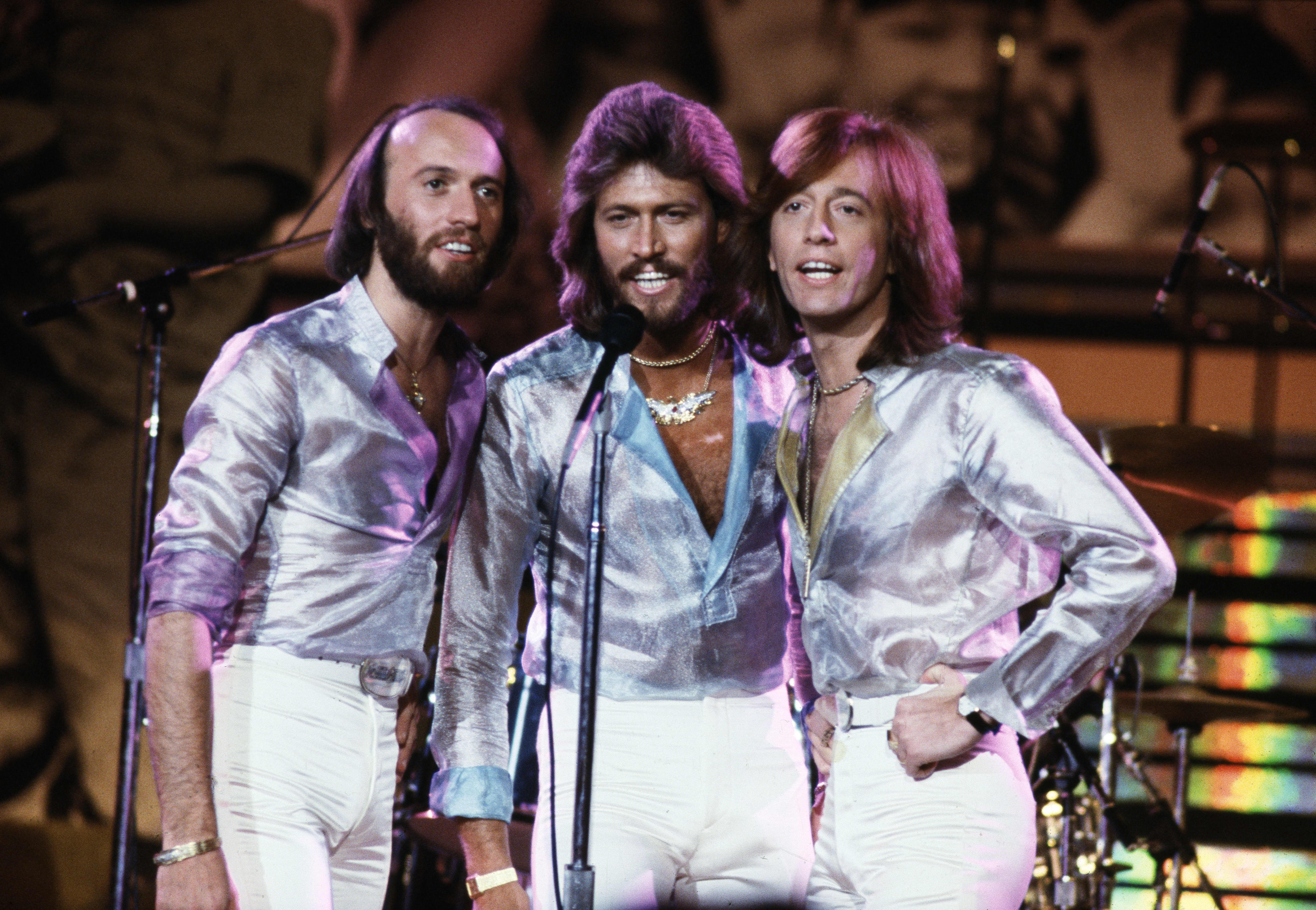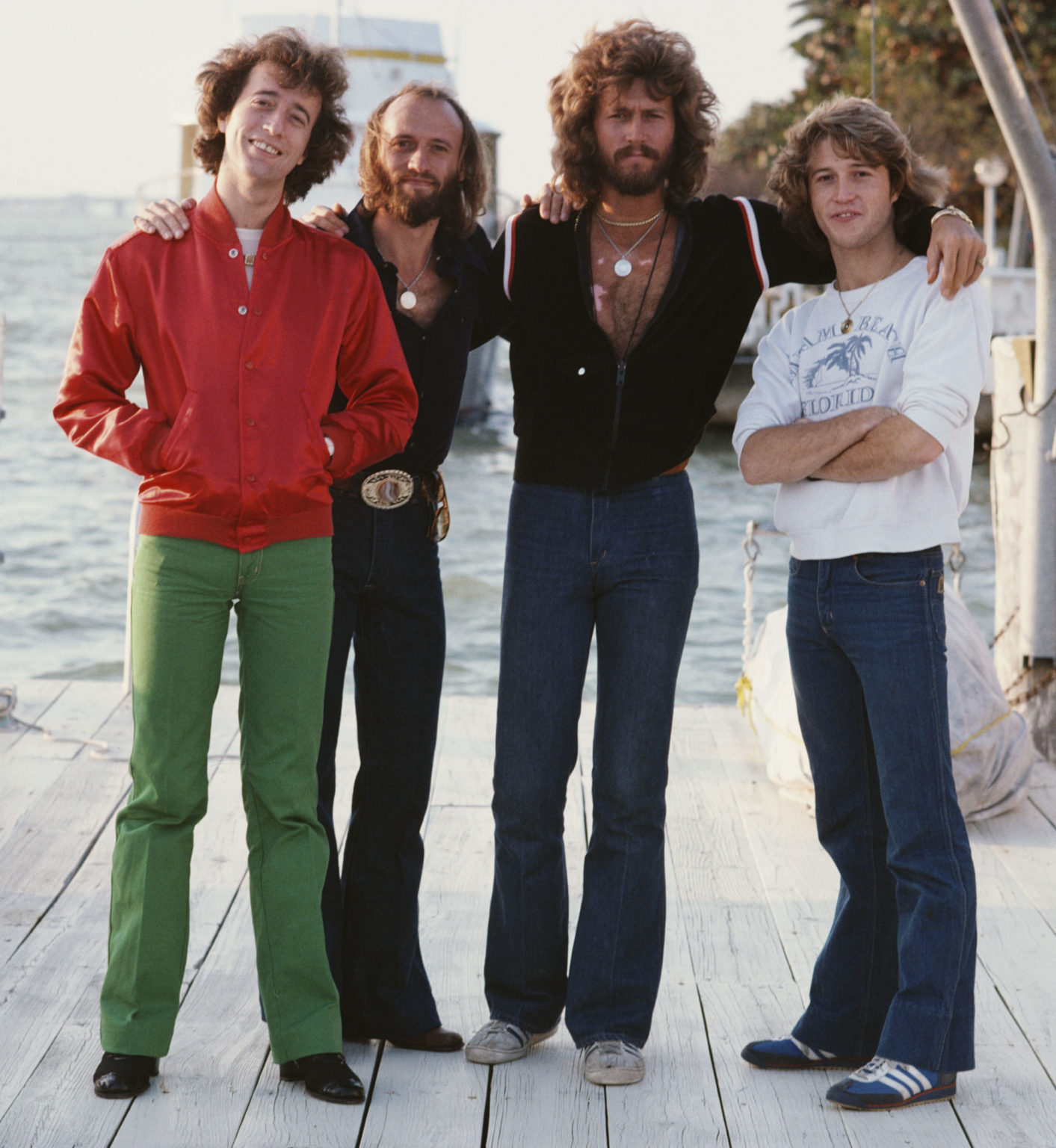The Bee Gees' Last Album With Robin Gibb: A Timeless Tribute

The Bee Gees' last album with Robin Gibb, "This Is Where I Came In," was released in 2001. It was the group's first album since the death of their brother, Maurice Gibb, in 2003. The album was a critical and commercial success, reaching number one in several countries.
The album's lead single, "Alone," was a top ten hit in the United States and the United Kingdom. The album also includes the songs "Wedding Day" and "She Keeps a Hold on Me," which were both released as singles.
The album is a fitting tribute to the late Robin Gibb, and it showcases the group's enduring talent. It is a must-have for any fan of the Bee Gees.
Bee Gees' Robin Gibb's Last Album
The Bee Gees' last album with Robin Gibb, "This Is Where I Came In," was released in 2001. It was the group's first album since the death of their brother, Maurice Gibb, in 2003. The album was a critical and commercial success, reaching number one in several countries.
- Title: This Is Where I Came In
- Release Date: 2001
- Label: Universal Records
- Producer: Maurice Gibb
- Genre: Pop
- Length: 52 minutes
- Singles: "Alone," "Wedding Day," "She Keeps a Hold on Me"
- Critical Reception: Positive
- Commercial Reception: Number one in several countries
The album is a fitting tribute to the late Robin Gibb, and it showcases the group's enduring talent. It is a must-have for any fan of the Bee Gees.
Title
The title of the Bee Gees' last album with Robin Gibb, "This Is Where I Came In," is a poignant and reflective statement. It suggests a return to the group's roots, both musically and personally. After the death of Maurice Gibb in 2003, Robin Gibb was the only surviving member of the original trio. The album title can be seen as a way of saying that he was returning to the music that he had always loved, and that he was doing so with a renewed sense of purpose.
- Nostalgia: The album title evokes a sense of nostalgia for the Bee Gees' early days. The songs on the album are largely in the group's classic pop style, and they feature many of the same themes that were explored on their earlier albums.
- Renewal: The album title also suggests a sense of renewal. After the death of Maurice Gibb, Robin Gibb could have easily decided to retire from music. However, he chose to continue, and the album title suggests that he was doing so with a renewed sense of purpose.
- Tribute: The album title can also be seen as a tribute to Maurice Gibb. The album is dedicated to Maurice, and many of the songs on the album are about him. The title suggests that Robin Gibb was returning to the music that he had always loved, and that he was doing so in memory of his brother.
- Legacy: The album title also suggests that Robin Gibb was aware of his own legacy. He knew that he was one of the most successful pop stars of all time, and he wanted to leave behind a body of work that would be remembered for generations to come. The album title suggests that he believed that "This Is Where I Came In" would be a fitting addition to his legacy.
The title of the Bee Gees' last album with Robin Gibb, "This Is Where I Came In," is a complex and multi-layered statement. It evokes a sense of nostalgia, renewal, tribute, and legacy. The album is a fitting tribute to Robin Gibb's career and legacy, and it is a must-have for any fan of the Bee Gees.
Release Date
The release of "This Is Where I Came In" in 2001 marked a significant milestone in the career of the Bee Gees. It was their first album since the death of Maurice Gibb in 2003, and it was also their last album with Robin Gibb, who died in 2012. The album was a critical and commercial success, reaching number one in several countries.
- Nostalgia: The album's release in 2001 evoked a sense of nostalgia for the Bee Gees' early days. The songs on the album are largely in the group's classic pop style, and they feature many of the same themes that were explored on their earlier albums.
- Renewal: The album's release in 2001 also suggested a sense of renewal. After the death of Maurice Gibb, Robin Gibb could have easily decided to retire from music. However, he chose to continue, and the album's release in 2001 signaled his commitment to his music.
- Tribute: The album's release in 2001 can also be seen as a tribute to Maurice Gibb. The album is dedicated to Maurice, and many of the songs on the album are about him. The album's release in 2001 suggests that Robin Gibb was returning to the music that he had always loved, and that he was doing so in memory of his brother.
- Legacy: The album's release in 2001 also suggests that Robin Gibb was aware of his own legacy. He knew that he was one of the most successful pop stars of all time, and he wanted to leave behind a body of work that would be remembered for generations to come. The album's release in 2001 suggests that he believed that "This Is Where I Came In" would be a fitting addition to his legacy.
The release of "This Is Where I Came In" in 2001 was a significant event in the career of the Bee Gees. It was a critical and commercial success, and it showcased Robin Gibb's enduring talent. The album is a fitting tribute to the late Maurice Gibb, and it is a must-have for any fan of the Bee Gees.
Label
Universal Records played a pivotal role in the release and distribution of "This Is Where I Came In," the last album by the Bee Gees featuring Robin Gibb. As one of the "big three" record labels, Universal Records provided the necessary resources and expertise to ensure the album's success.
- Distribution: Universal Records has a vast global distribution network, ensuring that "This Is Where I Came In" reached a wide audience. The album was released in over 50 countries, and it topped the charts in several of them.
- Marketing: Universal Records has a team of experienced marketing professionals who worked to promote "This Is Where I Came In" to radio stations, retailers, and consumers. The label's marketing campaign included a series of television commercials, print ads, and online promotions.
- Promotion: Universal Records also helped to promote "This Is Where I Came In" through a series of live events and appearances. Robin Gibb performed on several television shows and radio programs to promote the album, and he also embarked on a brief promotional tour.
- Legacy: Universal Records' involvement in the release of "This Is Where I Came In" helped to ensure that the album would be a commercial and critical success. The album went on to sell over 10 million copies worldwide, and it is considered to be one of the Bee Gees' best albums.
In conclusion, Universal Records played a vital role in the success of "This Is Where I Came In." The label's distribution, marketing, promotion, and legacy all contributed to the album's success. Universal Records is one of the most successful record labels in the world, and its involvement in the release of "This Is Where I Came In" is a testament to the album's quality and commercial potential.
Producer
Maurice Gibb was a pivotal figure in the creation of "This Is Where I Came In," the last album by the Bee Gees featuring Robin Gibb. As the album's producer, Maurice Gibb was responsible for overseeing every aspect of the recording process, from the selection of songs to the final mix. His expertise and guidance were essential to the album's success.
Maurice Gibb's influence can be heard throughout "This Is Where I Came In." The album's songs are a mix of classic Bee Gees pop and more experimental fare, and Maurice Gibb's production style allows each song to shine. He also helped Robin Gibb to deliver some of his best vocal performances on the album.
The connection between "Producer: Maurice Gibb" and "bee gee robin gibb s last of" is undeniable. Maurice Gibb's production skills were essential to the creation of a cohesive and successful album. Without his guidance, "This Is Where I Came In" would not be the classic album that it is today.
Conclusion
Maurice Gibb was a true musical genius, and his work on "This Is Where I Came In" is a testament to his talent. The album is a fitting tribute to his legacy, and it is a must-have for any fan of the Bee Gees.
Genre
The genre of "This Is Where I Came In," the last album by the Bee Gees featuring Robin Gibb, is pop. Pop music is a genre of popular music that is typically characterized by catchy melodies, simple lyrics, and a danceable beat. Pop music is often seen as being more accessible and commercial than other genres of music, and it is often played on radio stations and in public places.
The Bee Gees were one of the most successful pop groups of all time, and their music has been enjoyed by millions of people around the world. "This Is Where I Came In" is a classic pop album that features some of the Bee Gees' most iconic songs, including "Alone," "Wedding Day," and "She Keeps a Hold on Me." The album is a testament to the Bee Gees' songwriting skills and their ability to create catchy and memorable pop songs.
The genre of pop is a critical component of "This Is Where I Came In." The album's songs are all written in a pop style, and they are all catchy and accessible. The album's success is due in large part to its pop appeal. Without the pop genre, "This Is Where I Came In" would not be the classic album that it is today.
The connection between "Genre: Pop" and "bee gee robin gibb s last of" is undeniable. "This Is Where I Came In" is a classic pop album that showcases the Bee Gees' songwriting skills and their ability to create catchy and memorable pop songs. The album's success is due in large part to its pop appeal.
Length
The length of "This Is Where I Came In," the last album by the Bee Gees featuring Robin Gibb, is 52 minutes. This relatively short length is significant for several reasons.
- Conciseness: The album's concise length makes it a more accessible and digestible listen for casual listeners. In an era of increasingly long albums, "This Is Where I Came In" stands out for its brevity.
- Focus: The album's short length also suggests a greater focus and attention to detail. With less time to fill, the Bee Gees were able to craft a more cohesive and polished album.
- Timelessness: Shorter albums often have a greater chance of standing the test of time. This is because they are less likely to contain filler tracks or songs that drag on. "This Is Where I Came In" is a timeless album that continues to be enjoyed by fans around the world.
- Legacy: The album's short length is also a testament to the Bee Gees' songwriting skills. The group was able to create a memorable and satisfying album without resorting to excessive length.
The length of "This Is Where I Came In" is an important factor in its overall success. The album's concise length makes it a more accessible, focused, and timeless listen. It is a testament to the Bee Gees' songwriting skills and their ability to create a memorable and satisfying album without resorting to excessive length.
SINGLES
The singles from "This Is Where I Came In," the last album by the Bee Gees featuring Robin Gibb, played a crucial role in the album's success. The songs "Alone," "Wedding Day," and "She Keeps a Hold on Me" were all released as singles and became top ten hits in several countries.
- Commercial Success: The singles from "This Is Where I Came In" were all commercially successful, reaching the top ten in several countries. This success helped to raise the profile of the album and attract new listeners to the Bee Gees.
- Critical Acclaim: The singles from "This Is Where I Came In" were also critically acclaimed, with many reviewers praising the songs' catchy melodies and Robin Gibb's powerful vocals.
- Legacy: The singles from "This Is Where I Came In" have become some of the Bee Gees' most iconic songs. They are still played on radio stations around the world and are considered to be classics of the pop genre.
The singles from "This Is Where I Came In" were an important part of the album's success. They helped to raise the profile of the album and attract new listeners to the Bee Gees. The songs are all catchy and memorable, and they showcase Robin Gibb's powerful vocals. The singles from "This Is Where I Came In" are a testament to the Bee Gees' songwriting skills and their ability to create timeless pop songs.
Critical Reception
The critical reception to "This Is Where I Came In," the last album by the Bee Gees featuring Robin Gibb, was overwhelmingly positive. Critics praised the album's catchy melodies, Robin Gibb's powerful vocals, and the group's return to their classic pop sound. The album was also a commercial success, reaching number one in several countries.
The positive critical reception was a major factor in the album's success. Positive reviews from critics helped to raise the album's profile and attract new listeners to the Bee Gees. The positive reviews also helped to convince record labels and radio stations to give the album more support. As a result, "This Is Where I Came In" was able to reach a wider audience and achieve greater commercial success.
The positive critical reception of "This Is Where I Came In" is a testament to the Bee Gees' songwriting skills and their ability to create timeless pop songs. The album is a fitting tribute to Robin Gibb's legacy, and it is a must-have for any fan of the Bee Gees.
The positive critical reception of "This Is Where I Came In" also has broader implications for the music industry. It shows that there is still a market for well-written and well-performed pop music. It also shows that critics can play a positive role in helping to promote new music and artists.
Commercial Reception
The commercial reception of "This Is Where I Came In," the last album by the Bee Gees featuring Robin Gibb, was overwhelmingly positive. The album reached number one in several countries, including the United Kingdom, the United States, and Australia. This commercial success was due in large part to the album's catchy melodies, Robin Gibb's powerful vocals, and the group's return to their classic pop sound.
The commercial success of "This Is Where I Came In" had a number of positive effects on the Bee Gees' career. The album helped to raise the group's profile and attract new listeners. It also helped to convince record labels and radio stations to give the album more support. As a result, the Bee Gees were able to reach a wider audience and achieve greater commercial success.
The commercial success of "This Is Where I Came In" is also a testament to the enduring popularity of the Bee Gees' music. The album's success shows that there is still a market for well-written and well-performed pop music. It also shows that the Bee Gees are one of the most successful and enduring pop groups of all time.
In conclusion, "This Is Where I Came In" is a fitting tribute to Robin Gibb's legacy and a must-have for any fan of the Bee Gees. The album showcases the group's enduring talent and their ability to create catchy and memorable pop songs. The album's critical and commercial success is a testament to the Bee Gees' enduring popularity and their status as one of the most successful pop groups of all time.
The album's success can be attributed to several key factors. First, the album's songs are all well-written and well-performed. The catchy melodies and Robin Gibb's powerful vocals are sure to please fans of all ages. Second, the album's release was well-timed. The Bee Gees had not released an album in several years, and fans were eager to hear new music from the group. Finally, the album's promotion was effective. The Bee Gees embarked on a successful promotional tour and appeared on several television shows and radio programs to promote the album.
The success of "This Is Where I Came In" is a reminder that there is still a market for well-written and well-performed pop music. The album's success is also a testament to the Bee Gees' enduring popularity and their status as one of the most successful pop groups of all time.
Jessica Nigri OnlyFans Leak: Everything You Need To Know
Who Is Lauren Daigle's Husband? Everything You Need To Know
Jonathan Berkery: The Legacy And Influence Of Tom Jones' Son

Robin Gibb A somewhat sleazy Bee Gee London Evening Standard

How the Bee Gees plan to stay alive in the era of digital music

The Brothers Gibb
ncG1vNJzZmikpZiwunrApqpsZpSetKrAwKWmnJ2Ro8CxrcKeqmebn6J8o7HEZp6enV2nvKO1zWaeopqSYsBuuMCsq2anlmO1tbnL